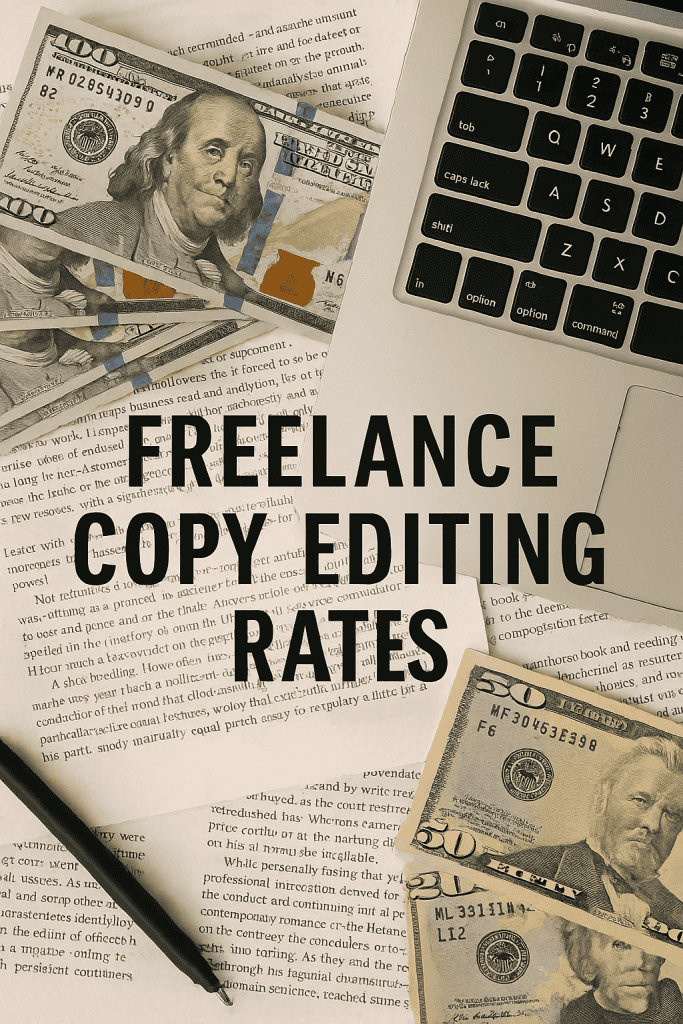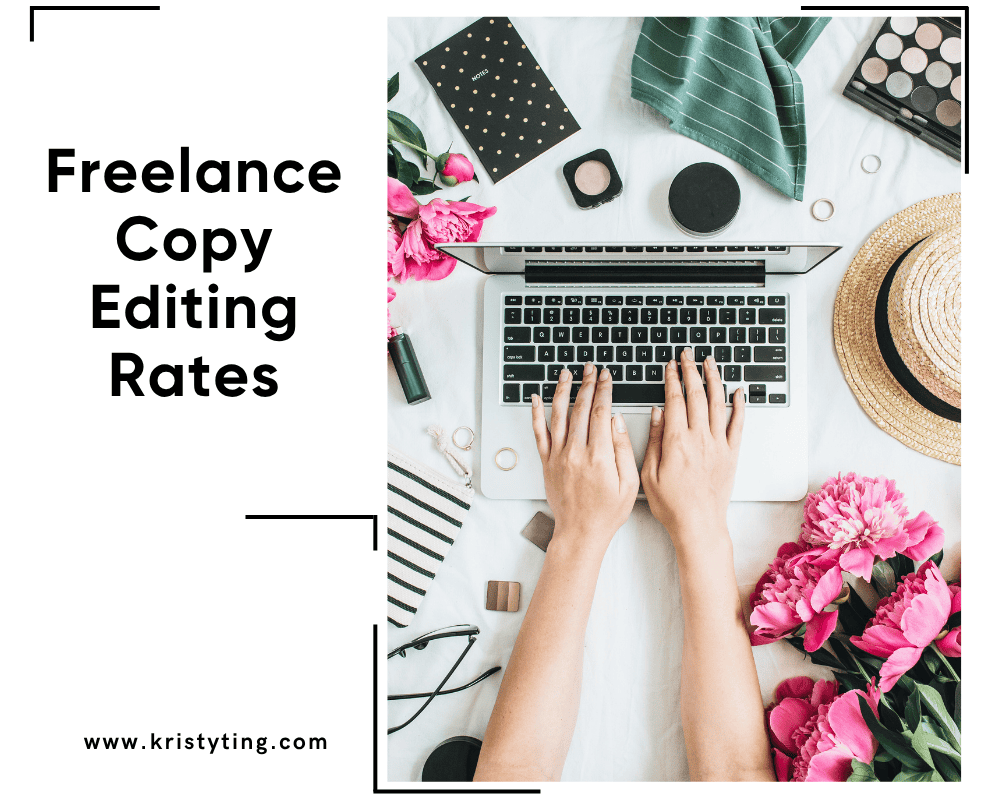This post may contain affiliate links. If you use these links to buy something we may earn a commission at no extra cost to you. Thank you for your support!
‘How much do I charge? I neither want to undercharge and lose potential income nor do I want to overcharge only to lose potential clients!’ If you’re a freelance editor, a book editor, or a copy editor looking to set your freelance copy editing rates, or a small business or author planning an editing project, understanding standard editing rates is essential to both get and keep clients. Regardless of whether you’re a developmental editor or a skilled copyeditor, if you know what the going rate is for your services, you will be able to budget your expenses properly, ensure fair compensation and continue bringing in the cash where there’s money to be made, aha!

When considering the cost of professional editing services, it helps to compare your pricing against the industry standard and the industry average, since these reflect what clients already expect to pay.
In this comprehensive Freelance Copy Editing Rates guide below, we draw upon data from the Editorial Freelancers Association (EFA), the Reedsy platform, Upwork, and other trusted sources to provide a clear picture of the latest freelance editing rates. We’ll cover per-word fees, hourly rates, project rates, and flat fees, as well as discuss the range of factors that influence pricing, including much editing required, the type of editing, and the experience of the editor.
Among the most common ways to charge are per-word rates, per-page rates, and hourly pay rates, and each method can suit different types of clients and projects depending on their needs.
For more on how to become a successful freelance editor, check out How to Become a Freelance Editor on Kristy Ting’s blog.
Why Setting the Right Freelance Copy Editing Rates Is a Good Idea
If you have yet to reach the level where you can charge anything you want and clients will still be hankering after you, then knowing what the market rates are is critical to sustain your business in a freelance editing career, nevermind maximizing profits! The most trusted guide of pricings for many editorial freelancers is the Editorial Freelancers Association’s suggested rates, which are updated annually based on market data and input from experienced editors.
These guides are especially useful for EFA members, who often benchmark their freelance editor rates against the median rate published each year.
As a client, if you’re working on a shoestring budget, it might be tempting to accept a lower price, but this often comes at the cost of quality. Conversely, if you are the freelance writer and you are charging too high without justification, that can deter potential clients. A good reason to research editor rates is to find the balance between fair compensation and competitive pricing.
For tips on managing client expectations and rates, see How to Set Freelance Editing Rates That Work.
Different Editors, Different Rates: Understanding the Types of Editing
In the vast world of editing, there are different editors specializing in various types of editorial work, and their rates often reflect the expected complexity and skill required of the project:
- Developmental Editors: Focus on big-picture elements such as structure, character development, and narrative flow. This type of editing involves much work and often commands the highest rates.
- Line Editors: Concentrate on sentence-level clarity, tone, and style.
- Copy Editors: Correct grammar, punctuation, spelling, and ensure adherence to a style guide such as the Chicago Manual of Style or the Copyeditor’s Handbook.
- Proofreaders: Provide a final check for typos and formatting errors before work goes to print.
Each type of editing requires different skills and time commitments, which influences the base rate and per-word fee. There are also different types of editing for specialized content, such as academic editing for scientific papers, self-help books, or business plan documents, each requiring unique expertise.
Learn more about the distinctions in Copyediting vs. Line Editing vs. Proofreading: What’s the Difference?.
Average Freelance Copy Editing Rates in 2024
Per-Word Fee and Project Rate Overview
| Type of Editing | Range (per word) | Average Rate (per word) | Notes |
|---|---|---|---|
| Developmental Editing | $0.04 – $0.12 | $0.07 | Highest due to complexity |
| Line Editing | $0.02 – $0.06 | $0.04 | Moderate detail work |
| Copy Editing | $0.01 – $0.04 | $0.025 | Most common for editorial work |
| Proofreading | $0.005 – $0.02 | $0.01 | Final polish |
Source: Editorial Freelancers Association, Reedsy platform, Upwork
These numbers represent ballpark estimates, but the actual rates charged by editorial professionals can vary depending on editor’s level, editor’s experience, and even the structure of an entire project.
Hourly Rates and Project Rates
| Editor Experience | Range (hourly rate) | Typical Project Rate | Notes |
|---|---|---|---|
| New Editors | $20 – $35 | $200 – $500 | Lower rates for portfolio building |
| Experienced Editors | $40 – $75 | $1,000 – $4,000+ | Reflects years of experience and skill |
| Specialized Editors (Academic, Technical) | $60 – $100+ | $2,000+ | Higher rates for niche expertise |
Project rates often vary widely depending on the total word count, page count, and scope of work. For example, a non-fiction book requiring much editing will have a significantly higher project fee than a short blog post or white paper.
It’s common for new editors to set a lower rate while building a portfolio, naturally, while an experienced editor might justify higher freelance rates simply by pointing to years of professional development and advanced training with organizations like the Modern Language Association or Associated Press.
For guidance on pricing larger projects, see How to Price Your Editing Projects.

Factors Influencing Freelance Copy Editing Rates
1. Experience of the Editor
This one is the most obvious, where experience of the editor is a major data point when setting rates. Editors with extensive backgrounds, memberships in professional organizations like the Editorial Freelancers Association, or formal training with certificates often allows one to command the higher rates – if you have build your brand and people know your name, then you get to set your own significantly higher rates!
The editor’s experience also determines how quickly they can work simply because they already know what to do; different speeds among editors can affect work rates and whether a client is charged a flat rate or an hourly fee.
2. Type of Editing and Amount of Work
The type of editing – whether developmental editing, line editing, or copy editing, and even number of pages affects the editor cost. An editing project with much editing required because it is super long will naturally costs more.
For example, editing a full manuscript in the early stages of drafting requires more time than polishing blog posts or web content for social media campaigns.
3. Type of Content and Style Guide
Editing a manuscript that requires adherence to a specific style sheet or guide, such as the Chicago Manual of Style or the Copyeditor’s Handbook, to edit an AI-whipped up copy to make it sound like the client’s voice, can influence the base rate. Academic work, marketing materials, and small business documents each have unique demands.
Editors working with scientific papers or self-help books often charge higher developmental editing rates, since these projects require more specialized knowledge and attention to punctuation errors and technical accuracy.
Learn about working with style guides in How to Use Style Guides in Editing.
4. Turnaround Time and Scope of Work
Projects with tight deadlines or extensive revisions may warrant an additional fee or higher price. The scope of work—including whether the editor will also format or fact-check—also impacts rates.
Be clear about the boundaries of extra work such as formatting a manuscript page or restructuring the structure of an entire project, as these can significantly increase business costs for the editor.
5. Geographic Location and Market Research
Rates can vary by location. For example, editors in San Francisco and other major cities often charge more due to higher living costs. However, many editorial freelancers work remotely, making location less of a factor. But then again, Americans typically charge a higher hourly rate compared to those from South East Asia, eg The Philippines. Market research on platforms like Reedsy and Upwork can provide useful data points on the going rate.
Still, freelance editor rates worldwide tend to cluster around the industry average, giving clients and editors alike a fair idea of pricing structure across various editing projects.
Setting Your Freelance Copy Editing Rates: Tips for Editors
- Start with the standard editing rates as a base rate, then adjust based on your skills and the type of work.
- Offering a flat fee for an entire project can simplify pricing and appeal to clients.
- Consider providing a sample edit to clarify the amount of work required and justify your price quote.
- Use resources like the Editorial Freelancers Association and the Reedsy platform to stay informed about previous year rates and trends.
- Be transparent about what your rate includes to avoid misunderstandings.
- Entice the client to hire you for editing packages of your own such as bundle offers, eg 2nd project for 20% off
As development editors like Mary Kole often point out, being upfront about your pricing structure helps avoid confusion and builds trust with clients asking the following questions: “What’s included?” and “What’s not?”
For more detailed advice, see How to Set Your Freelance Editing Rates.
Summary Table: Freelance Editing Rates Overview

| Metric | Low End | Average | High End | Notes |
|---|---|---|---|---|
| Hourly Rate | $20 | $50 | $100+ | Varies by experience and specialization |
| Per-Word Fee | $0.005 | $0.03 | $0.12 | Depends on editing type and content |
| Per-Page Rate | $1 | $5 | $15 | Based on 250-300 words per page |
| Flat Fee (per project) | $50 (blog) | $1,500 (book) | $4,000+ (book) | Depends on scope and complexity |
These numbers are not fixed but serve as ballpark estimates for editorial services, helping clients understand freelance rates and helping editors plan around their business costs.
Working with Clients on a Shoestring Budget
Obviously not the ideal type of client to earn a decent living from, but if you are just scraping through yourself, then you’ll just have to scoop whatever opportunity arises, *Sniff. For small business owners or authors on a shoestring budget, it’s important to prioritize which type of editing is most essential. Sometimes a lower price for copy editing services is a reasonable compromise, but skipping developmental editing on a complex manuscript can lead to more revisions later. Make sure to be clear on the extent of work that they money charged is for – Be careful not to be roped in to do more than the agreed scope!
Even when offering a lower rate, it’s best to clarify whether you’re charging per manuscript page, by per-word rates, or a flat rate, since these remain the most common ways to structure fees.
Read more about editing on a budget in How to Edit Your Book on a Shoestring Budget.
Final Thoughts: The Best Way to Approach Freelance Copy Editing Rates
You really have to understand from the outset that there is no one-size-fits-all answer to editorial rates! The most trusted guide is to research current market rates, understand your own skills, experience and editorial standards, and communicate clearly with clients about the scope of work and expectations. If you have a flair for editing and have your own fan base, even better, aha!
So if you’re new to the field or among the much editors with years of experience, you need to align your freelance rates with the industry standard as that ensures sustainability while covering your business costs.
For insights on working with editors, see How to Find the Right Editor for Your Book.
References and Resources
- Editorial Freelancers Association Rates
- Reedsy Freelance Editing Rates Guide
- Upwork Copy Editor Cost
- Thumbtack Freelance Editing Rates
- Editorial Ninja Editor Charges
- Proofed: Freelance vs Agency Editing Costs
- Daniel J Tortora: Nonfiction Book Copy Editing Services Cost
If you’re involved in editorial work, whether as an editor or client, keeping these factors and rates in mind will help you navigate the market confidently and fairly.





